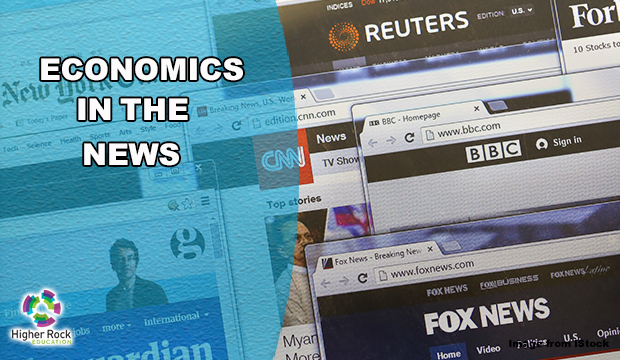
Economics in the News – March 20-26, 2023
Economics impacts our lives every day. Below are some of the top storylines from this past week related to economics.
o First Citizens Bank announced that it has acquired troubled Silicon Valley Bank, after the former bank collapsed in the second largest bank collapse in American history. Customers of Silicon Valley Bank will automatically become customers of First Citizens, which is based in Raleigh, N.C. First Citizens Bank is one of the top 20 banks in the United States and is the largest family-controlled bank in the country.
First Citizens Bank has acquired all the deposits and loans of SVB in the deal, according to the Federal Deposit Insurance Corp. (FDIC). The 17 former SVB branches opened Monday as branches of First Citizens Bank. Regulators hope that the deal will aid in shoring up the trust in the United States in regional banks. While the FDIC retains an estimated $90 billion of the $167 billion in total assets, First Citizens will acquire $72 billion at a discount of $16.5 billion. [Associated Press]
o Experts believe that the recent bank collapses of Silicon Valley Bank and Signature Bank will have ripple effects throughout the American financial system and pose a great risk for global growth. While most economists do not anticipate a major financial crisis, they are concerned of a heightened risk due to tighter credit restrictions for households and businesses. The impact would have an effect with a decrease in demand for other countries’ goods and services.
The growth concerns bring back memories of the 2007-09 financial crisis when the impacts were felt on a global scale. Economists are not expecting a recourse of the financial crisis because banks are in better financial shape and central bankers and regulators have a wide range of tools to prevent individual banks from initiating a systematic failure. [The Wall Street Journal]
o Americans are becoming increasingly pessimistic about their children’s future. A Wall Street Journal-NORC Poll showed that growing skepticism due to economic conditions. The poll surveyed 1,019 adults and four out of every 10 people surveyed cited healthcare and housing costs as major worries, while two-thirds of the poll indicated that inflation was a big concern.
Americans continue to lose faith in the value of obtaining a college education as a way to increase their financial well-being. Heavy debt and graduating without specific job skills were cited as reasons that a four-year college degree may not be worth the costs. The poll found disturbing trends in the happiness of Americans, with only 12 percent describing themselves as “very happy,” the least since the NORC began asking the question in 1972. [The Wall Street Journal]
o Utah became the first state to pass legislation to limit the use of social media for minors and require parental permission for kids to use platforms such as Instagram, TikTok and Facebook. The two bills that are set to take effect March 1, 2024 will prevent children from using social media from 10:30 p.m. to 6:30 a.m., require age verification before joining and offer the opportunity to sue companies on behalf of children who can claim that social media have harmed them.
While the new law seeks to limit children’s exposure to the addictive features of social media, it is unclear how it will be enforced. Critics also have concerns that the bills violate teens’ privacy and freedom of speech. Legal experts anticipate legal battles to play out over the next year as well. [Time]
o Gym memberships are notoriously difficult to cancel. The Federal Trade Commission has proposed a new rule to ease the burden to cancel unwanted subscriptions or memberships. The Commission receives thousands of complaints each year of companies trying to manipulate consumers to paying for subscriptions or memberships that they do not want.
Companies such as gyms and cell phone or cable companies create hoops to jump through and bet that customers will become too impatient, busy or confused to cancel. The proposed change could create a “Click to Cancel” provision, requiring companies to make it just as easy to cancel as it is to enroll. It would aim to give consumers a clearer idea of what they are signing up for in advance. [NPR]